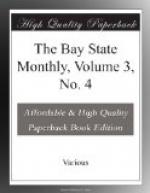The original name of the settlement was Bare (or Bear) Cove. The name was changed to Hingham, and the town incorporated Sept. 3, 1635, on the same day with Weymouth and Concord. There are but eleven towns in the State older than these three. Settlements having dates earlier than the incorporation were made in many towns, and there is proof that there were inhabitants here in 1633. There was a recognition of the place as a sort of municipality in 1634, for Bare Cove was assessed in that year. Rev. Peter Hobart, of Hingham, England, the first minister, arrived at Charlestown in June, 1635, and soon after settled in this town where many of his friends from Hingham, England, had already settled, from which fact the name of their old home was given to the new. Mr. Hobart and twenty-nine others drew for house-lots on the 18th of September, 1635. Grants of land were made at various times during the year 1635, and for several succeeding years. Hence it will be seen that, in this present year, two hundred and fifty years of the town’s history will have been completed, and the anniversary will be celebrated during the present month of September.
The close proximity of Hingham to Hull, of which the original name was Nantasket or Nantascot, well known during recent years as a famous summer resort, lends an added interest to one of the earliest of Hingham’s controversies. We find a record in July, 1643:—
There is chosen by the town, Joseph Peck, Bozoan Allen, Anthony Eames, and Joshua Hubbard, to go to the next Court to make the best improvement of the evidence the town have for the property of Nantascot, and to answer the suit that now depends, &c.
But this attempt of the inhabitants of Hingham to claim a title was summarily disposed of by the General Court, in September, 1643, as follows:—
The former grant to Nantascot was again
voted and confirmed, and Hingham
was willed to forbear troubling the Court
any more about Nantascot.
Under the lead of such a man as Rev. Peter Hobart, who appears to have been fearless and courageous, the inhabitants could not long remain at rest. In 1645, and through several succeeding years, there were difficulties of a very pronounced character between the inhabitants and the colonial magistrates, especially between Peter Hobart and Gov. Winthrop. The story has been briefly told as follows:—
The town of Hingham had chosen a certain man to be the captain of its military company, and had sent his name to the magistrates for approval. Before action had been taken upon the name the town reconsidered its action, and chose another man to be captain, and sent in his name. The magistrates were strongly inclined to confirm and appoint the first and to reject the second. Winthrop was especially pronounced and for his conduct in the affair Hobart impeached him before the General Court for maladministration in office. The contest was long and bitter.




